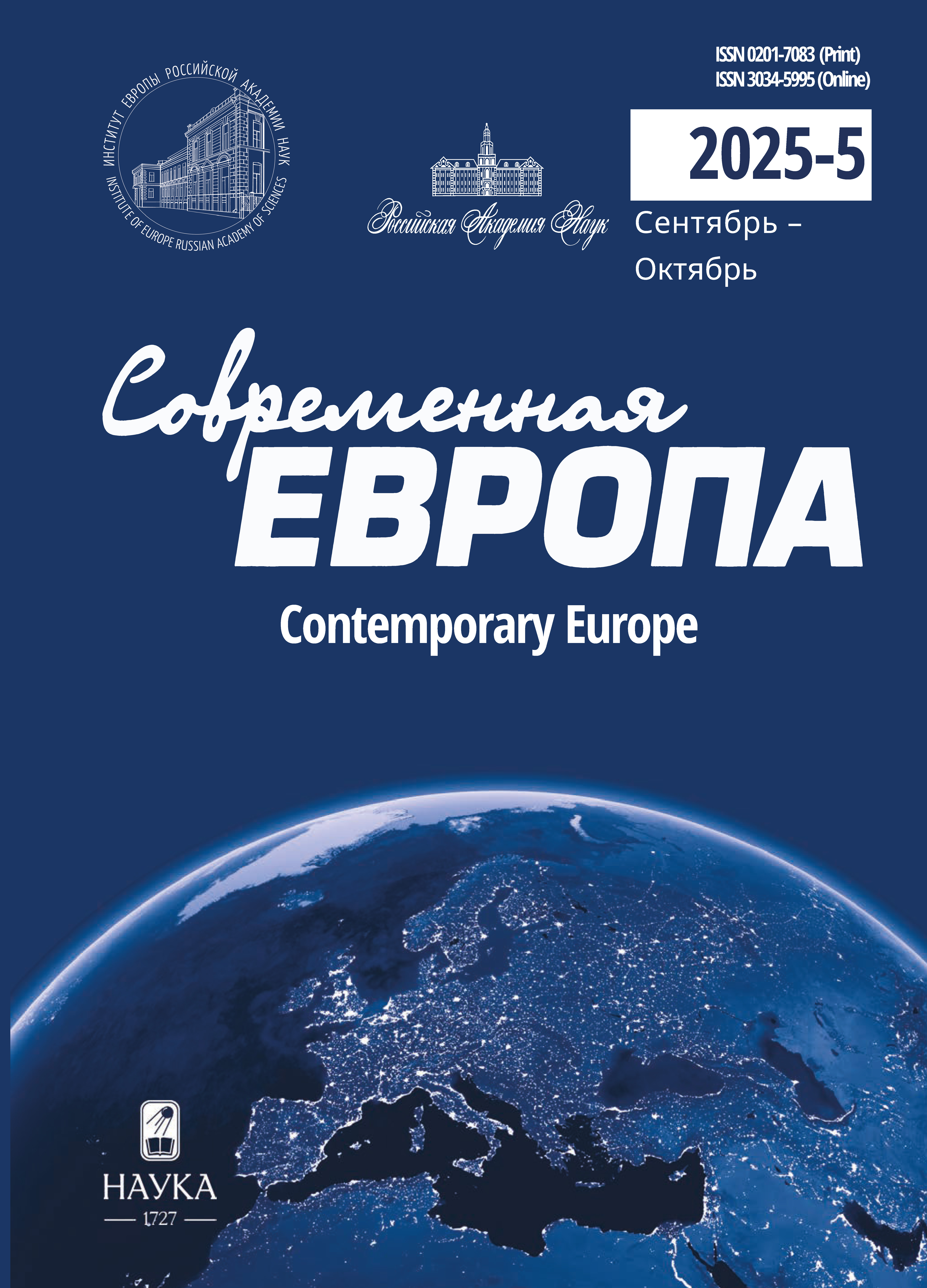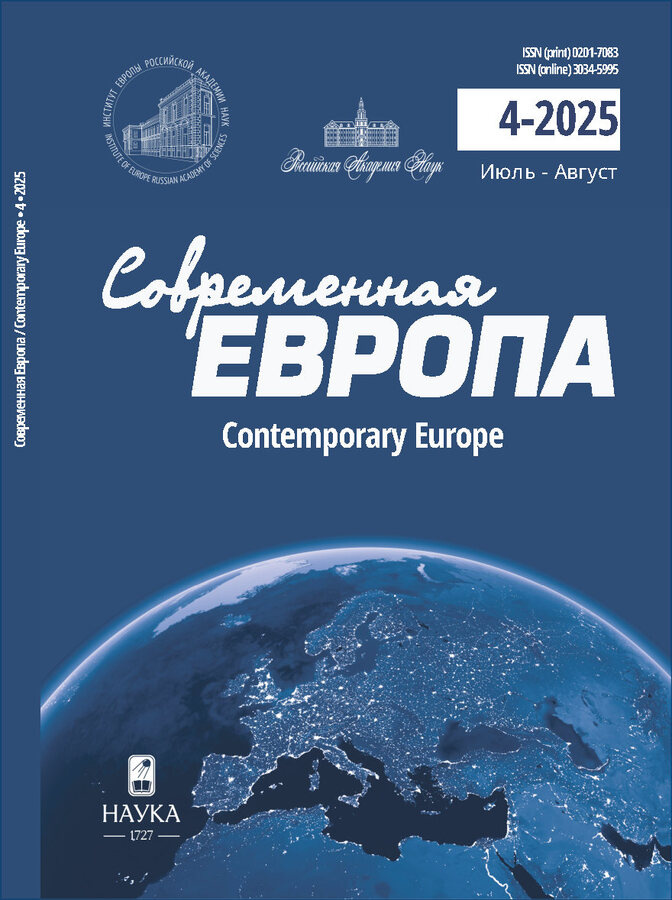КАЛИНИНГРАДСКАЯ ОБЛАСТЬ В РАМКАХ САНКЦИОННОЙ ПОЛИТИКИ ЕС
- Авторы: Войников В.В1
-
Учреждения:
- Высшая школа права Балтийского федерального университета им. И. Канта
- Выпуск: № 4 (132) (2025)
- Страницы: 52-63
- Раздел: САНКЦИОННАЯ ПОЛИТИКА
- URL: https://kazanmedjournal.ru/0201-7083/article/view/691004
- DOI: https://doi.org/10.31857/S0201708325040059
- ID: 691004
Цитировать
Полный текст
Аннотация
Ввиду географического положения Калининградская область всегда занимала особое место в контексте отношений России и Евросоюза. По этой причине введение масштабных ограничительных мер со стороны ЕС негативно повлияло на развитие региона. В этой связи необходимо идентифицировать, систематизировать и проанализировать односторонние ограничения и иные меры ЕС и отдельных государств-членов, которые затрагивают вопросы жизнеобеспечения Калининградской области. Цель статьи – выявить сущностные характеристики ограничительных мер ЕС и мер эквивалентного характера, оказывающих непосредственное воздействие на регион. В статье выделены основные ограничения наднационального и национального уровней, проведена их классификация и определена правовая природа. Сделан вывод, что ограничительные меры ЕС и иные меры эквивалентного характера в большей степени оказывают негативное воздействие на обеспечение транспортной доступности Калининградской области. Препятствия для сухопутного транзита противоречат международному праву, однако эффективные правовые средства противодействия таким мерам отсутствуют. В этих условиях ключевую роль в обеспечении транспортной связанности Калининградской области с основной частью России играет морской и воздушный транспорт.
Об авторах
В. В Войников
Высшая школа права Балтийского федерального университета им. И. Канта
Email: voinicov@yandex.ru
Доктор юридических наук, профессор Калининград, Россия
Список литературы
- Бутакова Я.С. (2023) Анализ определения международных экономических санкций в современной науке. Теоретическая и прикладная юриспруденция. № 4. С. 35–42. DOI: https://doi.org/10.22394/2686-7834-2023-4-35-42
- Войников В.В. (2023) Ограничения на въезд российских граждан в страны ЕС: политические и правовые аспекты. Современная Европа. № 3. С. 20–32. doi: 10.31857/S0201708323030026
- Гудев П.А. (2023) Свобода судоходства на Балтике (Риски и вызовы для Российской Федерации). Современная Европа. № 7. С. 98–110. doi: 10.31857/S0201708323070082
- Зверев Ю.М. (2023) Три российских региона на Балтике в условиях противостояния России и Запада. Балтийский регион. Т. 15. № 4. С. 24–41. doi: 10.5922/2079-8555-2023-4-2
- Земцов С.П. (2024) Санкционные риски и региональное развитие (на примере России). Балтийский регион. Т. 16. № 1. С. 23–45. doi: 10.5922/2079-8555-2024-1-2
- Иванова Е.М. (2016) Проблема санкций в международном праве: терминологический аспект. Московский журнал международного права. № 2. С. 181–187. DOI: https://doi.org/10.24833/0869-0049-2016-2-181-187
- Кехлер Х. (2019) Санкции и международное право. Вестник международных организаций. Т. 14. № 3. С. 27–47. doi: 10.17323/1996-7845-2019-03-02
- Клемешев А.П., Ворожеина Я.А. (2024) Эксклавность Калининградской области: опыт экспликации. Балтийский регион. Т. 16. № 2. С. 4–17. doi: 10.5922/2079-8555-2024-2-1
- Малиновский А.А., Трикоз Е.Н. (2024) Санкционная политика государства: историко-правовой обзор. Вестник Российского университета дружбы народов. Серия: Юридические науки. Т. 28. № 4. С. 705–729. doi: 10.22363/2313-2337-2024-28-4-705-729
- Тимофеев И.Н. (2024) Торговые санкции Европейского союза в отношении России: современная практика. Вестник Санкт-Петербургского университета. Экономика. № 40(2). С. 233–247. DOI: https://doi.org/10.21638/spbu05.2024.205
- Федоров Г.М., Зверев Ю.М. (2024) Российские регионы на Балтике в новых геополитических и геоэкономических условиях. Метаморфозы современного российского пространства: приоритеты общественно-географического анализа (XV научная Ассамблея АРГО) (29 сентября – 8 октября 2024 г., Краснодар): материалы Международной научной конференции. Т. 1. Отв. ред. А.Г. Дружинин. Кубанский государственный университет, Краснодар. С. 120–123.
- Franchini D. (2024) When finance becomes a weapon: the challUNKe of central bank sanctions under International Law. Journal of International Trade Law and Policy. Vol. 24. No. 1. P. 28-56 DOI: https://doi.org/10.1108/JITLP-07-2024-0041
- Lott A. (2023) Maritime Security in the Baltic and Japanese Straits From the Perspective of EEZ Corridors. Ocean Development & International Law. No. 54(3). P. 327–348. doi: 10.1080/00908320.2023.2265301
- Mallard G., Sun J. (2024) International Law, Security, and Sanctions: A Decolonial Perspective on the Transnational Legal Order of Sanctions. Annual Review of Law and Social Science. Vol. 20. P. 97–116. DOI: https://doi.org/10.1146/annurev-lawsocsci-042022-111630
- Pape R.A. (1997) Why Economic Sanctions Do Not Work. International Security. No. 22(2). P. 90–136. DOI: https://doi.org/10.1162/isec.22.2.90
Дополнительные файлы











